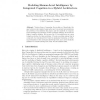180 search results - page 15 / 36 » AURELLIO: A Cognitive Computational Knowledge Representation... |
SIGLEX
1991
13 years 11 months ago
1991
A computationally relevant theory of lexical semantics must take into consideration both the form and the content of three different static knowledge sources -- the lexicon, the o...
KI
2007
Springer
13 years 7 months ago
2007
Springer
Various forms of reasoning, the profusion of knowledge, the gap between neuro-inspired approaches and conceptual representations, the problem of inconsistent data input, and the ma...
AI
1999
Springer
13 years 7 months ago
1999
Springer
Reasoning about the physical world is a central human cognitive activity. One aspect of such reasoning is the inference of function from the structure of the artifacts one encount...
COGSCI
2008
13 years 7 months ago
2008
How children go about learning the general regularities that govern language, as well as keeping track of the exceptions to them, remains one of the challenging open questions in ...
ECAI
1994
Springer
13 years 11 months ago
1994
Springer
1 A hybrid (symbolic/connectionist) cognitive architecture, DUAL, is proposed. It is a multi-agent system which consist of a large number of non-cognitive, relatively simple agents...

